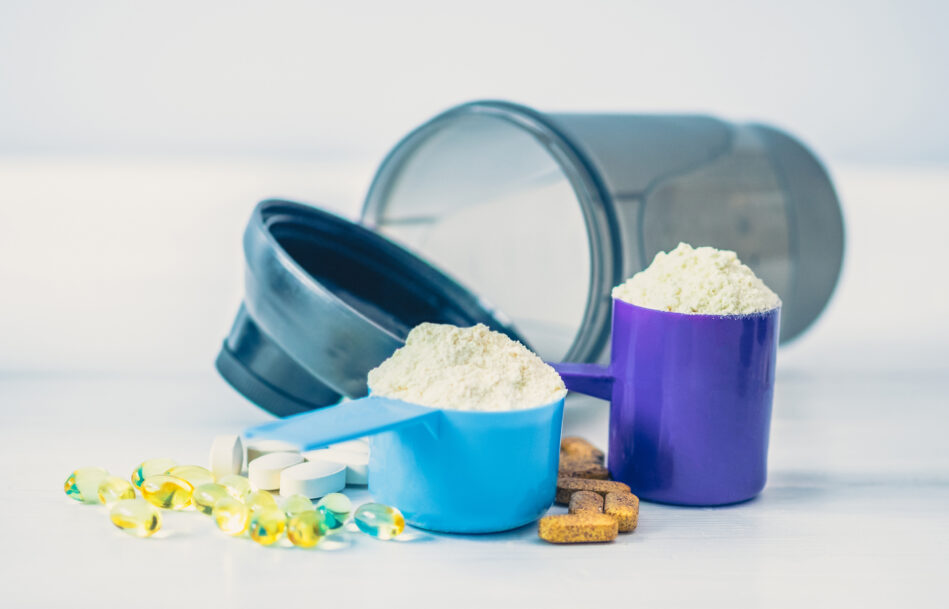There’s a lot of money in protein. In 2020, the protein supplement market was valued at $18.9 billion, with a projected yearly growth rate of 8.4 percent. This protein-mania isn’t a fly-by-night trend, either. People buy protein supplements — in the form of protein powders, chips, and bars — because it’s a vital supplement for health and fitness.
Amino acids are the building blocks of protein which your body requires to build and repair muscle, produce hormones and enzymes. Protein needs vary and are dependent on a variety of factors, including age, weight and physical health. While there are differing opinions on protein requirements, the Recommended Daily Allowance (RDA) for protein in adults s .36 grams per pound of body weight/day. That’s approximately 54g protein per day for a 150 pound adult. That said, for those who might be attempting weight loss, the American Dietetic Association suggests 0.7 grams per pound of body weight is ideal for maintaining muscle while losing weight.
That means a 180-pound person needs to consume 126 grams of protein, or the equivalent of two pounds of chicken breast. A single protein shake can deliver 15 to 30 grams, making them an efficient way to meet daily protein needs along with balanced meals.
Generally, a quality whey protein powder — one of the more popular protein supplement options — can be easier and more convenient for those “on the go” to consume. Simply add protein powder to a blender, along with liquid such as water, almond or coconut milk fruit and veggies, and a source of fat such as almond butter or chia seeds and blend together for an easy-to-drink nutritional shake. Be sure to check serving sizes to determine appropriate protein powder measures as different brands contain different amounts of protein per serving.
You should always consult with a doctor before taking a dietary supplement, especially if you’re on medications.
How Protein is Made
Many popular protein powders are made of whey. Without getting too technical, whey is the liquid leftover from the cheese-making process. Or, if you’ve ever skimmed off a liquidy layer from organic yogurt, well, that’s also whey (so don’t skim it off, stir it in for the protein benefits).
To turn that liquid whey from a yogurt barrier to a protein-packed supplement, it’s dried into a powder. The powder is then mixed with different ingredients, such as added sugars, artificial sweeteners, vitamins and minerals, and stabilizers, such as xantham gum. Once again, it’s important to reference nutrition labels as products can have varying amounts of calories and nutrients. Typically, a serving of whey protein powder yields around 120 calories, 25 grams of protein, and two to four grams of carbs and fats (each).
There is also an abundance of vegan protein powders that are madefrom peas, brown rice, hemp, and soy. The protein from these sources is filtered out (using ultrafiltration methods,enzymatic extraction or to solvent extraction) and then mixed with flavorings, nutritional ingredients, and stabilizers.
Quality Control
Plain and simple, the FDA “does not have the authority to review dietary supplement products for safety and effectiveness before they are marketed.” They also say that dietary supplements can be beneficial to your health but may involve health risks. Athletes should also be aware that certain supplements may appear on drug test results.
According to the FDA, the manufacturer is responsible for the quality and safety of their product. That can be scary as a consumer because how are you supposed to know whether a company is cutting corners or not? The good news is that nowadays, many top brands take the initiative to have their product tested.
There are a handful of trusted third-party companies that supplement manufacturers hire to check their products. If they pass, then that supplement is given a seal of approval (which varies depending on the third-party service).
Look for labels from NSF International, UL, and U.S. Pharmacopeia. The website Labdoor is also a great source. These are all independently run websites that test the ingredients of supplements and give them a grade based on purity and safety.
These third-party companies test for a number of things. For one, they verify that the product actually contains the ingredients in the amounts listed. Some companies use harmless fillers (such as rice flour) to cut corners and save money. They also test for toxins — such as mercury, titanium dioxide — and sport-specific certifications assert that there are no banned substances in a specific supplement.
Different Types of Protein Powder
Here’s a breakdown of the most common types of protein powders that you’re likely to find at your local natural food store, Vitamin Shoppe (or on Amazon since it’s 2021).
Whey Concentrate
This is the most basic and affordable protein option. The whey from cheese is turned into a powder and mixed with other ingredients. Compared to other sources of protein, this animal-based powder is typically lower in carbs and fats. Whey proteins from any source are a complete protein source, containing all 9 essential amino acids.
Whey Isolate
Whey isolate is virtually the same as whey concentrate, but the powder is processed through a microfilter to lower the fat and carb content even more. It’s not unusual for some whey isolates to boast one gram of fat and zero grams of carbs per 25 grams of protein.
Whey isolate is a popular choice among bodybuilders or gym enthusiasts who want to severely limit their calories and ingest as close to a pure protein source as possible.
Whey Hydrolysate
The most expensive whey protein option, whey hydrolysate, is broken down via enzymes, so it’s considered pre-digested. That may not sound appealing, but it means your body will break it down more efficiently. Some folks who experience tummy trouble with protein powders may prefer a whey hydrolysate.
Pea Protein
Pea protein, which is made by processing dried peas into a powder and mixing it with protein powder and other flavorings, contains all nine essential amino acids, however like other legumes, it is low in methionine.
A study on the effect of whey and pea protein on muscle thickness showed that both proteins, when taken in conjunction with a resistance training program, increased muscle thickness by 7.3 percent, suggesting that pea protein is as effective as whey.
Soy Protein
To make this protein blend, manufacturers take soybean flakes that are stripped of their fats, wash them in either alcohol or water, and then dehydrate and powderize them. The powdered soy is then mixed with protein powder.
While some may think that soy lowers testosterone levels, research has shown this not to be the case at the clinical level. So, unless you’re allergic to soy, this is an acceptable plant-based option.
Brown Rice Protein
In addition to being vegan-friendly, brown rice protein doesn’t contain allergens such as gluten, dairy, soy, eggs, and nuts. It is also known as being a quick-digesting protein source. Though brown rice is a natural carbohydrate, the rice is ground up and then treated with an enzyme that isolates the starch from the protein.
Hemp Protein
The fourth plant-based protein on this list boasts more fiber than the other varieties, which will help you feel fuller for longer. To make hemp protein, the seeds are ground up and about 90% of the fat is removed. That said, the fats are heart-healthy, so don’t be too worried.
Casein Protein
You’ve read a lot about the milk/cheese byproduct whey, but casein is the other milk protein. Compared to whey, casein digests more slowly. Because of its slow release time, it’s a popular supplement for those who are looking to build or retain muscle.
If a person goes without eating for an extended period, such as during sleep, the body may break down a small amount of existing muscle tissue to feed itself. [Casein, which doles out muscle-preserving amino acids for hours on end, prevents that. It also may be more effective for fat loss growth compared to whey.
One study in the Annals of Nutrition and Metabolism found that overweight cops who took casein, compared to whey protein and placebo groups, saw double the muscle growth than the placebo and more fat loss than the group supplemented with whey.
Beef Protein Isolate
This protein variant is derived from, as the name suggests, beef. Beef protein is usually made up of gelatin and collagen, not a NY strip and the consensus is that beef protein tastes about as good as it sounds. Studies have shown that it’s no more effective than whey.
It also contains less of the nine essential amino acids compared to whey.
How Much Protein Do You Need?
Ask five people how much protein you need, and there’s a good chance that you’ll get five different answers. How much protein you should consume depends on your weight, activity level and goals. The FDA says that adults should consume 50 grams of protein for a 2,000-calorie diet — which is the amount you need to function.
That’s not to say eating under 50 grams in a day will cause you to spontaneously combust. However, a lack of protein over time can result in a loss of muscle mass, less strength, a slower metabolism, and even anemia — which is when your cells don’t get enough oxygen.
If you want to build or retain muscle, then you’ll need to eat more protein. The American Dietetics Association and American College of Sports Medicine agree that 1.2 to 1.7 grams of protein per kilogram of bodyweight is ideal. The Director of Performance Nutrition at Precision Nutrition, Brian St. Pierre, MS, RD, has been quoted, saying “1.6 grams of protein is the floor… that’s the target you want to hit.”
St. Pierre also says that eating more protein than 1.6 grams per kilogram won’t result in more muscle mass but it may help mitigate fat gain. That’s because protein is a more thermic food, which means your body burns more calories digesting it than carbohydrates and fat. (Though you still need carbs for energy and fat to help regulate your hormones.)
When it comes to protein and hormone production, it is the amino acids in protein that help produce specific hormones such as estrogen, insulin, and thyroid hormones. If you eat enough protein — which, again, we’re saying is 1.6 grams per kilogram of bodyweight — then you don’t really need to worry about hormone production (or a lack thereof).
Final Thoughts
That was a lot to digest, so here are the takeaways:
- Protein is essential for building and maintaining muscle and regulating specific hormones.
- Recommendations for protein requirements vary significantly; from anywhere to .8g/kg pound of body weight to upwards of 1.6 to 2.2 grams of protein per kilogram of body weight.
- That amount of protein is probably more than you’re used to consuming, so a daily quality protein shake can help you meet your goal.
- There are a variety of types of protein powders; be sure to check nutrition labels when comparing products.
- Protein powders aren’t regulated by the FDA, but a handful of great third-party groups verify supplements. They include NSF International, UL, and U.S. Pharmacopeia, and Labdoor.com.






